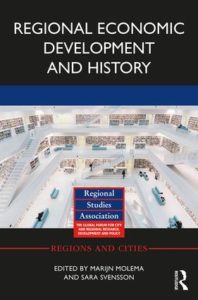The outcome of this network – a book Regional Economic Development and History has been published recently. Through a selection of accessible theoretical, methodological and empirical chapters, this book explores the connections between regional development and history. Drawing on the expertise of scholars in several disciplines, it links history to topics such as behavioural geography, interdependence, divergence and regional and urban policy. This innovative book will be of interest to researchers across regional studies, planning, economic geography and economic history.
Additionally, a general article on the network has been published in Planning Perspectives.
The past plays a crucial role in understanding, developing and implementing regional economic development policies. History reveals path dependencies in regions’ economies and informs about the successes and failures of policy instruments. Nevertheless, most politicians, policy makers, entrepreneurs, and indeed, academics are forward looking in their approaches. Whilst taking into account past lessons, they usually ignore historical approaches and methodologies in their analysis of regional economic development issues.
The main objective of the network is to explore, what a historic perspective may contribute to regional studies as well as current regional policy making and how approaches and methodologies used by historians can be better integrated in the regional studies. As such the network reflects on the methodologies and historiographies of both the historical sciences and regional studies. The network will examine processes of continuity and turning points in regional development and policy making; identifying those events in history that provide opportunity for advancement, or in some cases, regression. It links regional development to larger trends and processes such as state expansion and retraction, including austerity, economic crisis, European integration, EU enlargement and neighbourhood involvement, administrative professionalization, new public management, etc. Furthermore, it will specifically reflect on the outcomes and results of regional policy over the longue durée. Moreover, it also explores the ways in which regional development is conceptualised in different time periods and identifies typologies which can advance our understanding of regional policy development and its impact in different geographies over time. In short, the network is also an attempt to open new perspectives for regional economic and policy history.
In order to achieve the above stated aims the network will organise five ‘stand-alone’ international workshops at different locations in Europe. The workshops aim to encourage open discussion, learning and fostering collaboration between academics and policy makers. Each of the workshops are locally organised:
- Start-up meeting, London (25/26 April 2017)
- Cross border cooperation in the past, present & future, Budapest (29/30 June 2017)
- Historical constructions of regions and regionalism, Karlstad (30/31 October 2017)
- An historical account of regional resilience, Leeuwarden (14/16 January 2018)
- Urban policy development: long term continuities and changes, Ayr (October/November 2018)
Next to the five network workshops, two special sessions will be organised during the annual RSA European Conference in 2018 and 2019. The network aims to produce a number of concrete outputs in the form of articles in both historical journals and regional studies journals. You can follow us on our Facebook page.
Connecting our research ambitions to the global network of the RSA was an experience that was as efficient as inspirational.
Presentations and discussions within the network strengthened our idea, that Regional and Historical Studies can benefit from each other, a open new research perspectives within both fields of the sciences.
Marijn Molema, Fryske Akademy, Royal Dutch Academy of Sciences, The Netherlands
